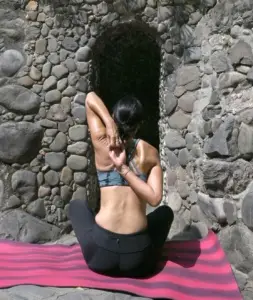
Mindful-based practices offer an effective and holistic approach to managing digestive disorders by incorporating gentle movements, breathing techniques, and relaxation practices. It can help alleviate symptoms such as bloating, indigestion, and constipation, while promoting overall digestive health and well-being.
Benefits of Digestive Disorders Therapy:
Considerations before Starting:
Mindful Poses for Digestive Disorders:
Breathing Exercises for Digestive Disorders:
Mindful Practice for Digestive Disorders:
Summary with Tips:
By incorporating these mindful poses, breathing exercises, and meditation techniques into your routine, you can support digestive health and alleviate symptoms of digestive disorders. These practices promote relaxation, stimulate digestion, and enhance overall well-being, contributing to a healthier and more balanced lifestyle.

GoInwards is an IRS 501(c)(3) Non-Governmental Organization (NGO), chartered to advance wellness through integrative health related awareness, prevention, intervention, and resilience-based educational programs.
FEIN 90-0609802